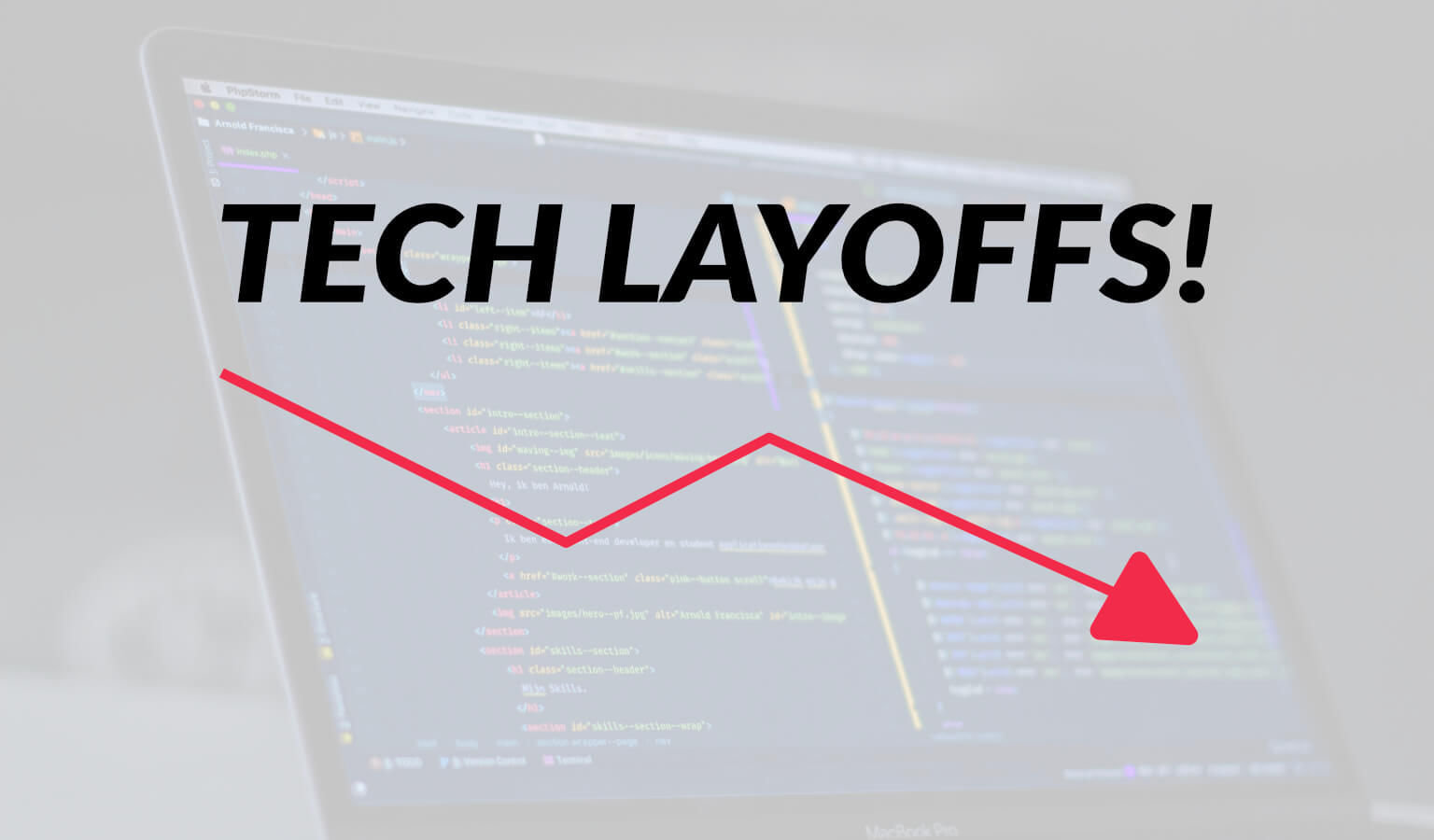How To Survive Tech Layoffs (5 Actionable Steps)
· Travis Rodgers · 11 min read
Getting laid off from a job is a terrible thing. In 2023, there were 260,000 layoffs in tech. This year, about 74,000 workers have been laid off from 255 companies.
Such is the nature of this post-covid economy.
Everybody’s like, why all the layoffs?
Well, COVID happened and sent everyone home to work, which caused a huge tech demand for remote, cloud-based solutions. Companies had hired a lot of people. Budgets went up. Then, the market took a downturn, and last year, companies had too many people to pay. They wanted to survive the downturn, so they had to get rid of people.
That’s the simple answer.
It’s not AI yet, it’s not the end of tech or the end of programming; it’s just the economy.
The good news is the economy can only go up from here. My last video made the case that there is a beginning of an uptrend again in tech jobs. People pushed back by disagreeing because they thought that meant instantly. No. This kind of reversal takes time. But the trends are positive.
But that doesn’t make you immune from layoffs.
So in this article, I want to give you 5 actionable steps that you can take to put yourself in a good position in the unfortunate event that you get laid off from your job.
If you prefer video…
Otherwise, continue reading.
And the first one I have to mention before we get to the post-layoff steps really starts before any layoff happens. And that is:
1. Have savings in place.
One of the goals in life is to not be put in a position where your income source (which is usually just one for many people) has the upper hand on you, as far as you’re able. You don’t want to be dependent on whether your boss wants to keep you or not.
So you’re making a good salary as a software developer. You’re arguing about making only $100,000 while the other guy is making $150,000.

Well, see those guys working on the roof in the 100-degree weather; they aren’t making either of those.
You’re pretty fortunate. So you make big bucks. You can save money easily.
But your lifestyle probably went up with your salary. You moved to a big city, you bought a new house at 7% interest, you eat out all the time, and you have a $1900 chair, three Macbooks, an iPhone, and a Tesla, but you don’t have any savings.
In a recent study by Bankrate, 1 in 5 people have no emergency savings at all.
So if a layoff happens, you’re in a panic instead of being in control of the situation.
This is just irresponsible living. We’ve become a country of very irresponsible people. You’re making six figures and spending it thinking nothing will ever happen. Things always happen. Life happens. And not having any savings to fall back on is a big problem.
So first, starting today, you need to set aside some money.
And it’s hard. Who wants to just put money somewhere to sit? And I know you’re sick of hearing it, but three months of living expenses is the goal because it usually takes that long to get back on your feet.
Say you need $10,000 a month to live. That’s $30,000 you need to set aside. It’s a lot, but it’s doable. Make some sacrifices in the next few months to get this ball rolling. The peace it will give you and the anxiety it removes surrounding your job status are priceless. In this life, you want to be in control of controllable things.
And currently you can earn some good interest from it sitting there. If you had $30,000 in a Capital One savings account, it would pay you $1500 bucks a year just to park it there.
And look, I hear you, investors. I’m all for investing your money, like all of it (that’s why I didn’t say 3-6 months), but this emergency fund is a whole different beast and should be in place separately for unforeseen circumstances, like being laid off. Unforseen circumstances are inevitable, and you want to be in control when they happen.
And think, if you had six months of savings, you could even say, after a layoff, I’m going take a month off to get my head straight and maybe test the waters on some other pursuits, all without the dread of being without your recurring income.
2. Let the world know about it.
Twitter, Linkedin, or whatever site you’re on, post your layoff in a professional manner with a call to action at the end for people to either let you know of any job openings or to retweet or repost to spread the word. Hiring managers would much rather take referrals over sifting through stacks of resumes.
I can’t say how many times I’ve seen people do this: They post about being laid off, and they get hundreds of responses. Of course, not all job leads are, but many of them are. People either recommend open roles in their company or a role that they know about in another company.
And they’ll be like you can use my name as a referral because people get paid well for referring talent.
And be sure to list your skillset in that post. I’m a software developer with 4 years of experience in X languages. I am certified in AWS, have my CCNA, and whatever else.
Also, let it be a reminder that you shouldn’t be a nobody on social media. You should be regularly active and growing that account and networking so that you don’t then post your job loss to a bunch of crickets, which I’ve seen as well.
And how do you grow on social media? Two easy steps:
Post 1-2 tweets a day. Just ask a question or give an opinion and people jump all over it. Literally, just post something like “Anyone not like VSCode?” or a statement like “JavaScript feels flimsy” or “What desktop accessory could you not live without?” and watch while people eat that up.
Respond to about 10 tweets a day, every day. This will force people to continually see your profile picture scattered about until they feel like they need to get to know you better.
3. Let your network know
Everyone has a network. It includes people you’ve worked with, people you’ve talked to in the past, your friends, and even family.
And if you’re like, no, I don’t really have anyone, then listen up; you need to begin, today, making networking part of your lifestyle. Talk to people you work with, meet new people, keep in touch with them on a regular basis, help people, and always be on the lookout to add people to your network and to be added to their network.
So when you walk in one day and find out it’s your last, you have people to reach out to. This is the time to reach out without hesitation.

I would think about all of my past jobs and the people I made friends with or contacts with while I was there, from coworkers to managers. Those people can vouch for my work. They can recommend me.
And then here’s the thing: Most of those people have moved on from those jobs to other companies. So, by reaching out to them, you get potential access to their new company and network within that company.
So I did some work at Golf.com; who were the devs there that I remember that I could look up on social media and reach out to?
I worked as an SRE for a few years, who are they people I worked with there that I could reach out to?
I worked as a Dev Rel, who are the people there that I can reach out to?
I’m going to be sending 50 emails or instant messages the very day after I’m laid off.
Even think about people you know who aren’t in your field. Their company has an IT department reach out to them.
Of course, this doesn’t get you the job. But it does give you opportunities that the traditional route of submitting resumes doesn’t. It’s real people who can potentially give you real opportunities.
This includes recruiters. If you’ve been ignoring them, now’s the time to reconnect. I don’t care about your opinion of recruiters; all walls need to come down. Take all the avenues you can think of.
4. Get a temporary job if needed
Now, one thing that drives me nuts is when I see people 6 - 12 months without a job and depressed and broke and not able to make it anymore.
Many of these people are in these predicaments because they are waiting around until they receive an equal or greater job than they lost.
In fact, I even see people complaining about getting an offer that’s lower than what they currently make and passing on it. Like, I’m worth 180K, and I won’t dare agree to this job offering me 140K.
What the what?
First of all, if I lost my job today and I didn’t have any savings, I would be delivering pizzas… by tomorrow. No shame. Because I have people depending on me. My wife and kids. I gotta make some money. Life is real.
If you’ve been six months without a job becuase you’ll only take another developer job, then that’s on you.
You could have been bringing in some sort of paycheck all along while looking for that next job. it doesn’t hurt your resume. You wouldn’t even put it on there. In fact, the next job would probably respect the fact that you haven’t been sitting around unemployed for six months or living off of unemployment.
So losing your job doesn’t mean you go broke. There are many easy jobs out there that will keep some sort of income going. There’s no shame in that. It doesn’t ruin your career.
5. Maybe this is a sign for you to think bigger about your career
And I don’t want to get too detailed on this because I’m actually creating a whole course on this (more info coming soon), but sometimes these kinds of unexpected events can become catalysts to some next phase in our lives.
I don’t know if anyone has told you this, but a large percentage of society has moved on from these desk jobs. We’re in an information age, an attention age—a unique time in history where we have millions of potential customers available from our laptops.
Perhaps you don’t really want to go back to coding in a cubicle. Perhaps you have some unique story and skill to share on YouTube. YouTube is bigger than Netflix. Perhaps you have a business idea that you just haven’t had time to work on. Perhaps you have people coming to you regularly for advice or to fix their problems, and you just haven’t had a chance to turn that into a business of your own.
Well, if you have that savings that I talked about earlier, you now have that time.
Perhaps this layoff is THE VERY thing you need in life to propel you into a better season of this life. A season that you own and one that excites you again.
So don’t shake off that layoff as 100% negative. Consider turning that unfortunate event into a fresh new start in your career.
So now, in the unfortunate event that you face a layoff, you’re equipped with some actionable steps to get back on your feet. But as AI continues to flood into our industry, you’ll also need to make sure you are learning the skills that will be in demand over the next decade.
And no, you don’t need heavy math, statistics, or any of that. Just go and download this free guide I’ve created just for you.
- What are skills you can acquire that AI cannot replace?
- Should you best prepare by specializing in a particular niche or becoming a robust generalist?
- What are some book recommendations or resources that you can use NOW to get ahead?
- It's all here 👇

This page may contain affiliate links. Please see my affiliate disclaimer for more info.



